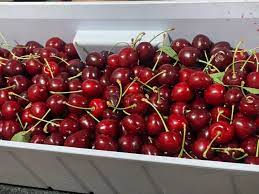ISLAMABAD: Gilgit Baltistan has recently marked a new phase in its agricultural sector by exporting cherries to China, following the Plant Health agreement between Pakistan and China in 2022. This region, known for its cherry orchards in Hunza, Nagar, Yasin, Phundar, and Nomal, benefits from an ideal climate and fertile land, contributing to the production of high-quality cherries.
The first shipment of fresh cherries to China signifies a notable development, considering China’s cherry market demands approximately 350,000 tons of cherries annually, within a market valued at $3 billion.
Arman Shah, CEO of Hashwani Group and owner of a significant cherry farm in Gilgit Rahimabad approved by Chinese Customs, highlighted the mutual benefits arising from this agricultural export partnership.
“The approval of Gilgit Baltistan cherry orchards by Chinese customs is a testament to the region’s high standards,” Shah stated. He also mentioned his cold storage facility, which enables exports beyond the cherry season, ensuring continuous supply.
Earlier, first consignment of six tonnes dispatched at the start of June with over 100 orchards now registered for exportPakistan has shipped its first consignment of fresh cherries to China marking the opening of Asia’s largest market for the industry.
The Trade Development Authority of Pakistan (TDAP) announced the shipment was dispatched to China on 5 June. It said under the phytosanitary agreement with China over 100 orchards have been registered with China’s General Administration of Customs.
According to a report from Dawn, the first shipment contained 6 tonnes of cherries and was transported by refrigerated truck over the border. The cherries were grown in key the key production region of Gilgit-Baltistan, which produces approximately 5,000 tonnes a season.
Following the initial shipment Pakistan hopes to ramp up supply and send 260 tonnes of cherries to China by the end of the month.The Pakistan Horticulture Development & Export Company (PHDEC) has been working with the local cherry industry on development, helping to educate growers on producing popular varieties.
PHDEC chief executive Athar Hussain Khokhar said by producing the required varieties of cherries, the country can capture a slice of the China market.“Proximity and growing demand for the fruit in the Chinese market are a major competitive advantage to Gilgit-Baltistan growers,” Khokhar said.
The Gilgit-Baltistan, known for its diverse fruit varieties such as sweet cherries, tangy apricots and juicy pears, benefits from an ideal environment. Nourished by fresh glacial water, ripened under golden sunbeams and sustained by gentle breezes from some of the world’s highest peaks, these cherries offer a delightful taste experience. Exporting fresh cherries to the Chinese market could significantly improve the lives of local Pakistani growers.
Chinese consumers hold cherries in high regard due to their rich color – red traditionally symbolizes good fortune – and their juicy, sweet flavor. Cherries are commonly gifted as presents, making both taste and appearance crucial factors. In China, there is a preference for cherries that are sweet, firm and have a deep red color ranging from mahogany to dark, measuring between 28 and 30 millimeters.
ISLAMABAD: Gilgit Baltistan has recently marked a new phase in its agricultural sector by exporting cherries to China, following the Plant Health agreement between Pakistan and China in 2022. This region, known for its cherry orchards in Hunza, Nagar, Yasin, Phundar, and Nomal, benefits from an ideal climate and fertile land, contributing to the production of high-quality cherries.
The first shipment of fresh cherries to China signifies a notable development, considering China’s cherry market demands approximately 350,000 tons of cherries annually, within a market valued at $3 billion.
Arman Shah, CEO of Hashwani Group and owner of a significant cherry farm in Gilgit Rahimabad approved by Chinese Customs, highlighted the mutual benefits arising from this agricultural export partnership.
“The approval of Gilgit Baltistan cherry orchards by Chinese customs is a testament to the region’s high standards,” Shah stated. He also mentioned his cold storage facility, which enables exports beyond the cherry season, ensuring continuous supply.
Earlier, first consignment of six tonnes dispatched at the start of June with over 100 orchards now registered for exportPakistan has shipped its first consignment of fresh cherries to China marking the opening of Asia’s largest market for the industry.
The Trade Development Authority of Pakistan (TDAP) announced the shipment was dispatched to China on 5 June. It said under the phytosanitary agreement with China over 100 orchards have been registered with China’s General Administration of Customs.
According to a report from Dawn, the first shipment contained 6 tonnes of cherries and was transported by refrigerated truck over the border. The cherries were grown in key the key production region of Gilgit-Baltistan, which produces approximately 5,000 tonnes a season.
Following the initial shipment Pakistan hopes to ramp up supply and send 260 tonnes of cherries to China by the end of the month.The Pakistan Horticulture Development & Export Company (PHDEC) has been working with the local cherry industry on development, helping to educate growers on producing popular varieties.
PHDEC chief executive Athar Hussain Khokhar said by producing the required varieties of cherries, the country can capture a slice of the China market.“Proximity and growing demand for the fruit in the Chinese market are a major competitive advantage to Gilgit-Baltistan growers,” Khokhar said.
The Gilgit-Baltistan, known for its diverse fruit varieties such as sweet cherries, tangy apricots and juicy pears, benefits from an ideal environment. Nourished by fresh glacial water, ripened under golden sunbeams and sustained by gentle breezes from some of the world’s highest peaks, these cherries offer a delightful taste experience. Exporting fresh cherries to the Chinese market could significantly improve the lives of local Pakistani growers.
Chinese consumers hold cherries in high regard due to their rich color – red traditionally symbolizes good fortune – and their juicy, sweet flavor. Cherries are commonly gifted as presents, making both taste and appearance crucial factors. In China, there is a preference for cherries that are sweet, firm and have a deep red color ranging from mahogany to dark, measuring between 28 and 30 millimeters.


